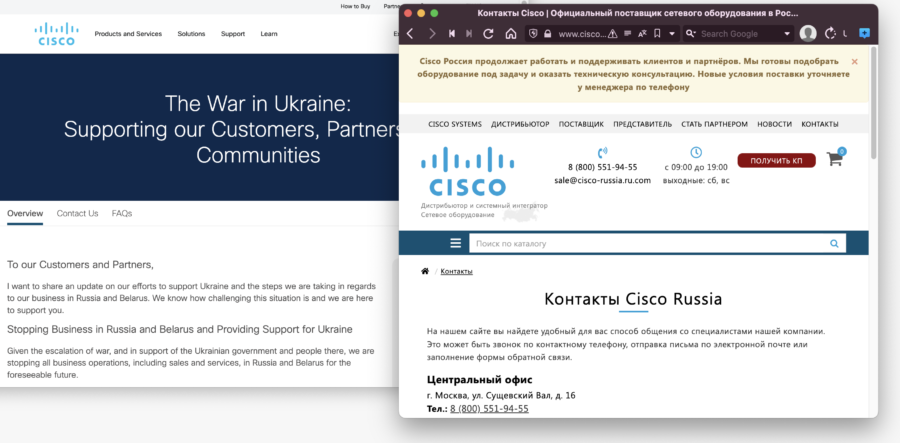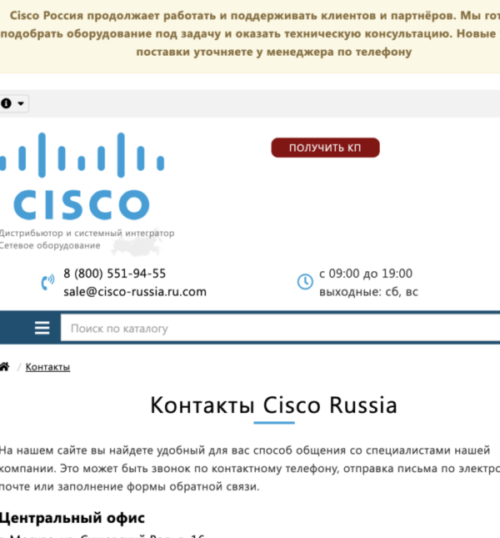Statements by international companies about their withdrawal from the Russian market are often worth absolutely nothing.
It's not enough to refuse signing new contracts in Russia. It's necessary to stop supporting the previously developed infrastructure, abandon launched projects, and stop service and maintenance. And, most importantly, to refrain from prolonging the contracts that have already been signed.
Unfortunately, many companies continue their operations in Russia despite all their promises to leave the country. They pay taxes to the state budget of Russia, used to buy weapons for killing Ukrainians, and to strengthen Vladimir Putin's totalitarian regime.
CISCO claims it stops Russia business yet continues as usual

Recently, CISCO, one of the largest telecommunication companies in the world, stated
:
"We are stopping all business operations, including sales and services, in Russia and Belarus for the foreseeable future."
Actually, this is not true.
This seems a powerful statement showing a strong moral stance. This is especially important in the light of CISCO's announcement that it is terminating service maintenance for already installed solutions, as it is impossible to make CISCO equipment purchased outside of Russia work without official servicing from the company.
CISCO understands this perfectly, and earns a great part of its income not only selling its equipment, but also providing maintenance, and carrying out regular trainings for personnel.
This shows that CISCO still maintains its equipment there. This is possible because CISCO operates not only and not even primarily directly but through a huge network of dealers and distributors which continue working with CISCO. Therefore, the head office of CISCO in Russia can be furloughed, but this is not enough.
We checked many websites of official CISCO distributors and found that they continue working. For example, a message on site cisco-russia.ru.com, one of CISCO's official representatives, confirms this fact explicitly:

We called the company by the given phone number, and the manager confirmed that we can order CISCO equipment, as its supply and maintenance continues. There will be no problems in the future, you can order anything -- the functioning of these solutions is guaranteed. One can assume that new equipment is supplied under partially illegal schemes with which CISCO has nothing to do.
However, this equipment's maintenance and service is impossible without the involvement of the parent company. This means all of CISCO's statements on ceasing operations in Russia were on paper only.
CISCO had already tried to skirt sanctions imposed on Russia. This happened after the EU introduced sectoral sanctions on many Russian banks and state-owned companies in 2014. CISCO Systems organized the development and production of equipment based on the Russian state "Experimental Plant of Scientific Instrumentation" owned by the Russian Academy of Sciences. All equipment was to be produced under a unique local brand, and CISCO would transfer the rights to the manufactured products to the factory after signing the relevant contract.
Notably, the transfer of rights to products is not a typical situation for CISCO. Similar examples are rare in the company's history. Nevertheless, CISCO managed to produce only a limited batch of equipment for Gazprom. Then they scrubbed the project. But it was the Russian initiative to discontinue the project as Russia preferred Chinese solutions to CISCO's.
In general, currently almost 20% of the entire Russian network infrastructure relies on CISCO equipment. If CISCO would have actually withdrawn its business from Russia, the consequences for the Putin regime would be immense, as this would have affected many Russian state-owned companies and Putin's oligarchs.
Every company that doesn't want to become an accomplice to the Putin regime's crimes should present an exit roadmap with dates and deadlines for the termination of the maintenance of the infrastructure critical to Putin.
Germany's SAP
CISCO is not the only company that continued operations in the Russian Federation after announcing its exit.
The German software giant SAP was going to do the same. It had announced its withdrawal but actually continued to service its clients. This led to a media scandal. Subsequently, SAP announced
a roadmap, according to which the company will stop servicing its Russian clients and stop operations in Russia for real.
It's time for CISCO to make a hard choice like SAP between supporting the freedom of Ukrainians or assisting Putin's totalitarian regime, which threatens pushing the world into the abyss of a nuclear war.
I really hope that this choice will be made in the near future.

Anton Shvets is a Ukrainian anti-corruption activist, investigator and blogger. Right now Anton defends Ukraine as a volunteer fighter in the Armed Forces of Ukraine.
Read more:
- French companies continue doing business as usual in Russia
- Big brands still fund Russian attacks on Ukraine: pissed consumers urge boycott
- How Western sanctions cripple Russia’s war machine: no modern tanks, navigation systems or drones
- “They were shot in the back of the head.” Eyewitness account of Russia’s murders of Bucha residents
- How Russia justifies the murder of Ukrainians: Russia’s 2022 “genocide handbook” deconstructed
- “Close the sky!” or how Russia bombed out my town of Borodyanka
- Ukrainian startups awarded $200,000 by Cisco (2016)

